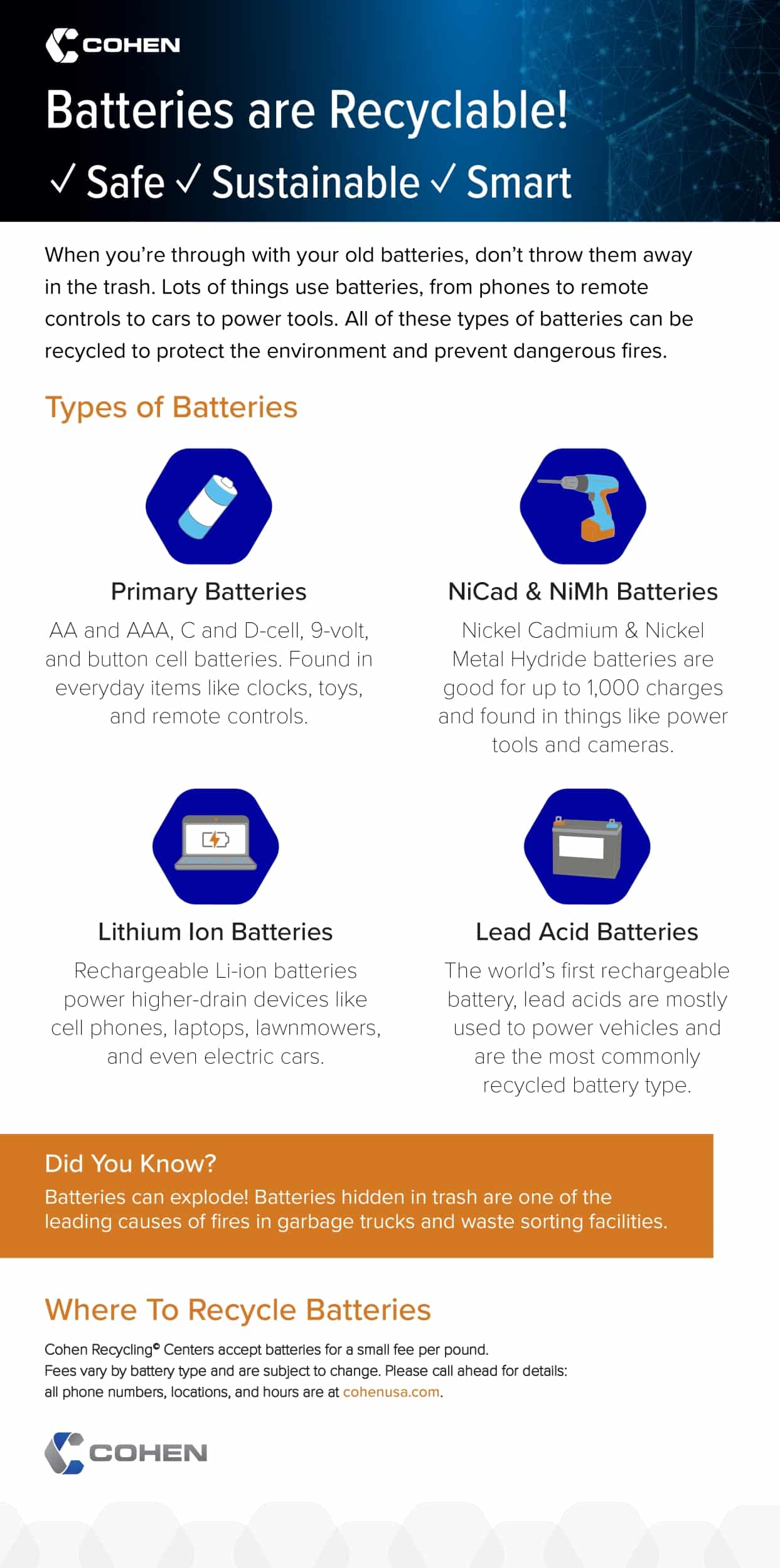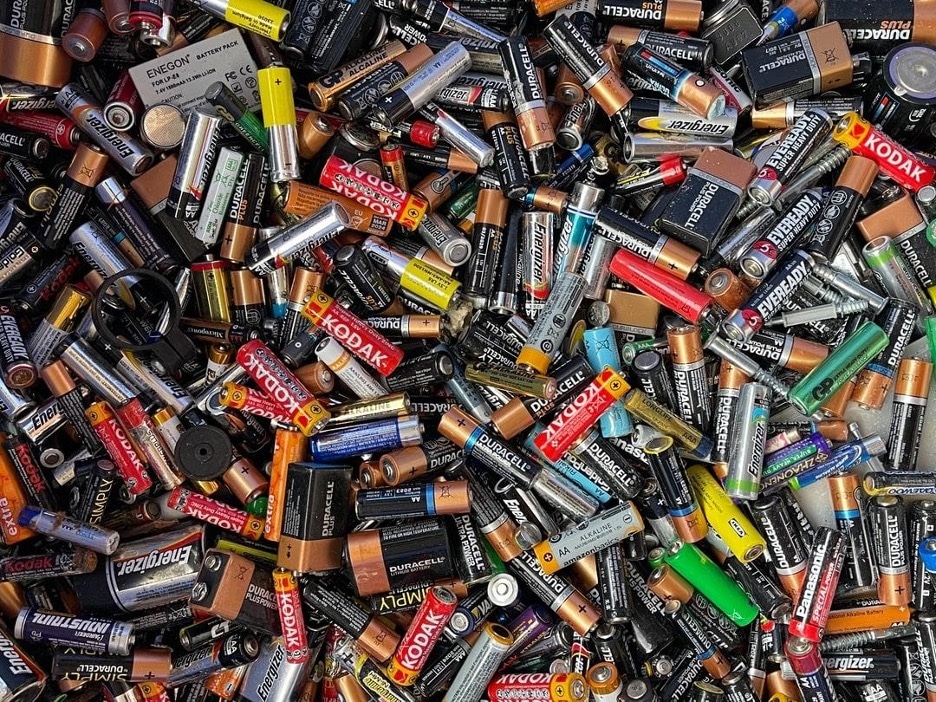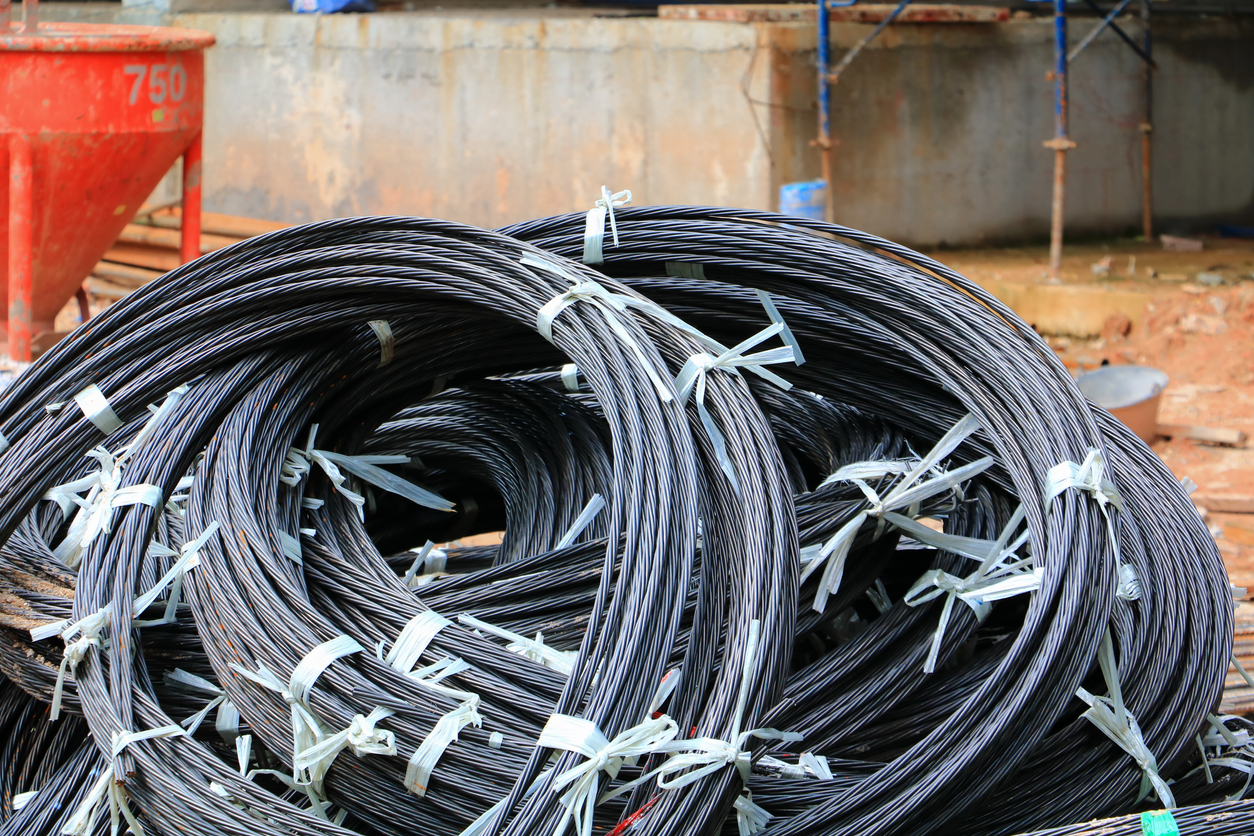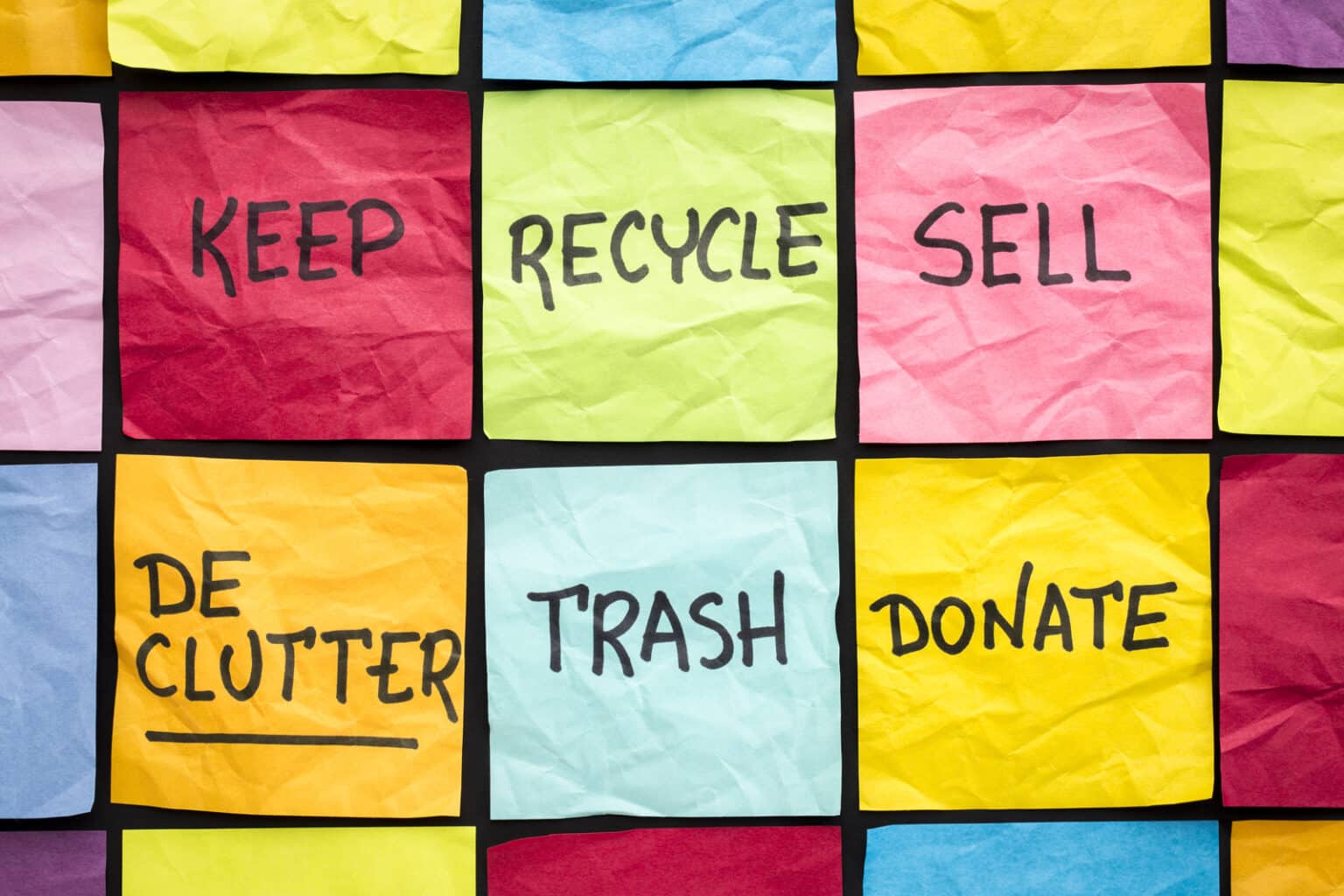Batteries power many of the devices you use on a daily basis, but there comes a day when even the longest-lasting batteries lose their power or fail to hold a charge. What should you do with them when their time is up? Even though batteries energize everything from your mobile device to your vehicle to the watch on your wrist, many consumers are unsure about best practices for used battery recycling.
Most batteries include chemicals like sulfuric acid, lithium, cadmium, or lead. No matter what type you’re disposing of — whether it’s a small alkaline battery, car battery, or cell phone battery — it’s important to follow the proper recycling process. When you fail to take steps toward safe recycling, your defunct batteries can pollute the environment in a number of harmful ways. Chemicals can harm plant life and wildlife — and even end up in food and water supplies.
Beyond pollution, batteries pose a fire risk when placed in the trash or at an illegal dump site. Some areas have outlawed throwing batteries in the trash to avoid accidental fire or pollution.
Additional benefits of sustainable recycling include:
- Lowering your waste disposal costs
- Reducing waste that’s sent to landfills
- Avoiding dangerous pollution
- Minimizing the need for additional mining
Taking the time to safely recycle your batteries is the responsible choice. While recycling requires some effort, the process doesn’t have to be complicated. There are collection points, easy recycling programs, and more to help consumers safely dispose of old batteries and hazardous waste. For the responsible consumer, recycling batteries is an easy decision.
Here are a few key tips:
Know Your Batteries
Before you start looking for ways to dispose of your batteries, it’s important to know which kind you’re dealing with. While all batteries should be handled with care, recycling lead batteries is often different from industrial battery recycling, and so on. Different types you might encounter include:
- Primary. This type includes AA, AAA, 9-volt, D-cell, and button cell batteries. They are typically non-rechargeable and are used in common household items.
- Nickel cadmium. NiCad batteries are rechargeable and can be reused up to 1,000 times. They’re often used in cordless household items and digital cameras.
- Nickel metal hydride. NiMH batteries are used in high-drain household devices because of their high-quality rechargeability.
- Lead acid. As the original rechargeable batteries, lead acid batteries are used in work vehicles. They’re highly toxic, but there are many options for recycling them.
- Lithium ion. Lithium ion batteries power items such as laptops and tablets, as well as electric vehicles.
Rechargeable, watch, and car batteries must be recycled due to the number of toxic chemicals and heavy metals they contain. However, primary batteries — which are more common — contain chemicals that are much less of a threat. These are the smaller batteries that power devices such as remotes, clocks, toys, and flashlights.
While this type should still be recycled to prevent unnecessary pollution, there are far fewer laws regulating primary battery recycling than for industrial or rechargeable battery processes.
Read Battery Recycling Laws
To launch the recycling process, set aside time to learn more about federal and state recycling laws and protocols in your area. Each state has its own laws about the way specific battery types should be disposed of. Brushing up on your state laws can help you avoid fines, change risky recycling habits, and find new ways to dispose of your hazardous waste.
Prepare for Recycling
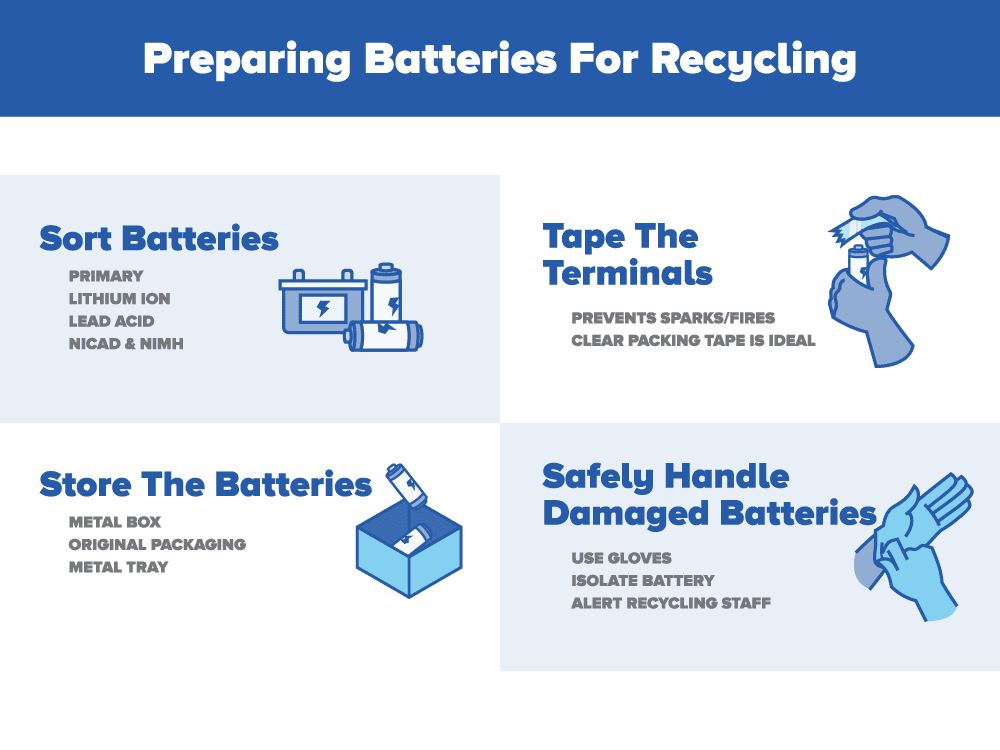
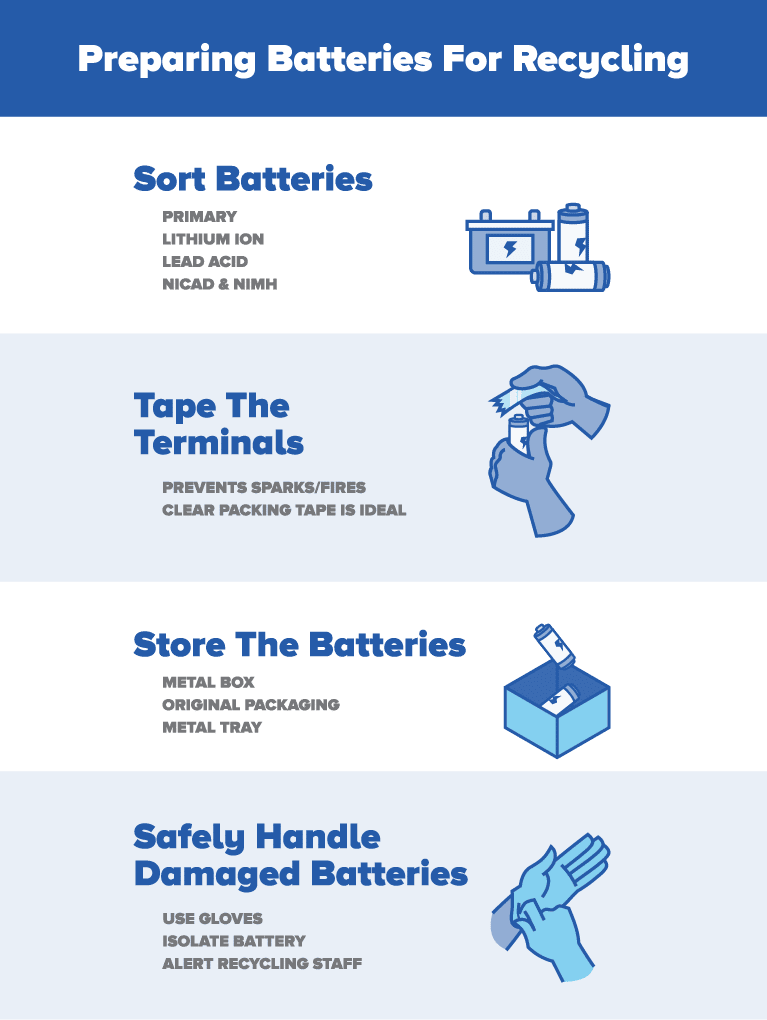
Once you know the laws in your area and what type of battery you’re dealing with, the next step is to properly prepare your old batteries for recycling. Below are some important steps for storing and disposing of batteries:
Sort Your Batteries
First, put on a pair of latex gloves to avoid contact with any powder or acid. As you begin to sort, be mindful of batteries that are covered with a rusty or white-colored crust or powder — these indicate exposed chemicals that can burn your skin.
Sort batteries into groups based on type, such as lithium ion or primary. If you can’t tell what type you have, put it in a separate container to be sorted later. Professionals at a retailer or recycling center can help you identify your unknown types.
TAPE THE TERMINALS
After sorting your batteries, take time to tape the terminals of each one. When the terminals of seemingly dead batteries touch, they can generate bursts of energy and heat. By taping the ends, you can eliminate the possibility of the batteries creating sparks or starting a fire.
The ideal tape for this process is clear packing tape, which can help recycling site professionals to sort your batteries once they’ve been dropped off. Make sure to cover both ends of the battery completely before moving on to the next one.
STORE YOUR BATTERIES
Whether you plan to drop your batteries off immediately after sorting or save them for a larger drop-off in the future, it’s important to place them in a safe container. Choose one that’s ideal for both long-term storage and transportation. Options include:
- Storing your batteries in a metal box. Avoid throwing batteries into a junk drawer or catch-all bag. Instead, all batteries should be stored in a metal container.
- Reusing original packaging. If you don’t have a metal box handy, your batteries’ original packaging is a safe place to store those that are waiting to be recycled.
- Lining your batteries up on a metal tray. An important step in the storage process is to line up batteries in a safe manner — they should be placed side by side. Make sure contact points don’t touch one another or the side of the tray or box.
Safely Handle Damaged Batteries
It’s common for old batteries to rupture or break over time. If you encounter a broken battery, take the following steps:
- Use gloves. Be careful to use latex gloves and avoid contact with liquid or powder that has leaked. You’ll often find remnants on the battery and the device it was powering.
- Isolate the battery. Separate the damaged battery in its own container away from all others.
- Alert the recycling staff. When you drop off the battery to be recycled, alert the staff so they can handle it appropriately.
Prior to rupturing, some types of batteries may swell. This can be brought on by damage, moisture, or age. The swelling is caused by heat and gas that develops inside the casing. If you encounter a swollen battery:
- Immediately discontinue use. Turn off the device as soon as possible and move it away from pets and children. Swollen batteries can leak toxic gas or catch fire.
- Remove the battery. Use gloves to remove the battery from its device. If it can’t be removed safely, bring the entire device to the appropriate retailer or recycling site where a professional can assist you.
- Tape the terminals. Continue using your latex gloves to carefully tape the ends of the battery.
- Isolate the swollen battery. Store the swollen battery in an open glass, ceramic, or metal container. It should be kept away from combustible or flammable materials and out of reach from pets and kids.
- Tell a professional. When you drop off the battery, alert the staff to the swollen state so they can place it in a fireproof box away from other batteries.
Find a Recycling Site
It can be intimidating to find the right place to dispose of your batteries. Fortunately, there are several ways to find a battery drop-off point that’s right for you. Use your local government website or a drop-off point locator to find a site that’s nearby.
Communities and local organizations often host electronic, hazardous waste, and battery collections to help citizens recycle safely. Other battery recycling sites include:
- Select retailers
- Recycling centers
- Local municipalities
Always check with your recycling site ahead of time to ensure it accepts the type of battery you’re disposing of. Many sites accept rechargeable, watch, and car batteries — but alkaline battery recycling is often more specialized.
Cost Vs. return
There’s one final point about recycling batteries: except for car and truck batteries, you’re not likely to make money from recycling them.
It costs more to handle and recycle most used batteries than the value of any metals that might be reclaimed. Because of that, most recycling companies charge a small fee for taking used batteries. Vehicle batteries are graded differently and may be worth some money.
Some communities have special drop-off points for electronics and batteries where they don’t charge for taking batteries on specific days year-round. Others will take your used batteries for free during spring clean-up drives. For the most part, though, those are exceptions rather than the rule.
Battery Recycling: The Bottom Line
It’s important to note that recycling batteries costs money — it’s common for recycling companies to charge a reasonable fee to take them off your hands. While you won’t make a lot of money recycling batteries, the social and environmental benefit far outweighs the small investment it takes to turn them in at a responsible location.
Whether you’re recycling your batteries for peace of mind or environmental responsibility, your habits can have a major impact on your community and the local environment. Recycling requires a little bit of research and effort, but the results are well worth it.
Cohen accepts all kinds of batteries for recycling. Some fees may apply based on hazardous material disposal costs. Fees are applied per pound of batteries and are payable in cash. Please call ahead to the recycling center you intend to visit with any questions.
Cohen believes every small action is worthwhile to protect the people in our lives and the environment we all live in. We hope you agree. Find a Cohen facility near you to learn more about smart recycling habits. To launch your recycling journey, find out what you can recycle at Cohen by checking our easy-to-use recycling library. For more information call us at (513)-422-3696 or contact us.
